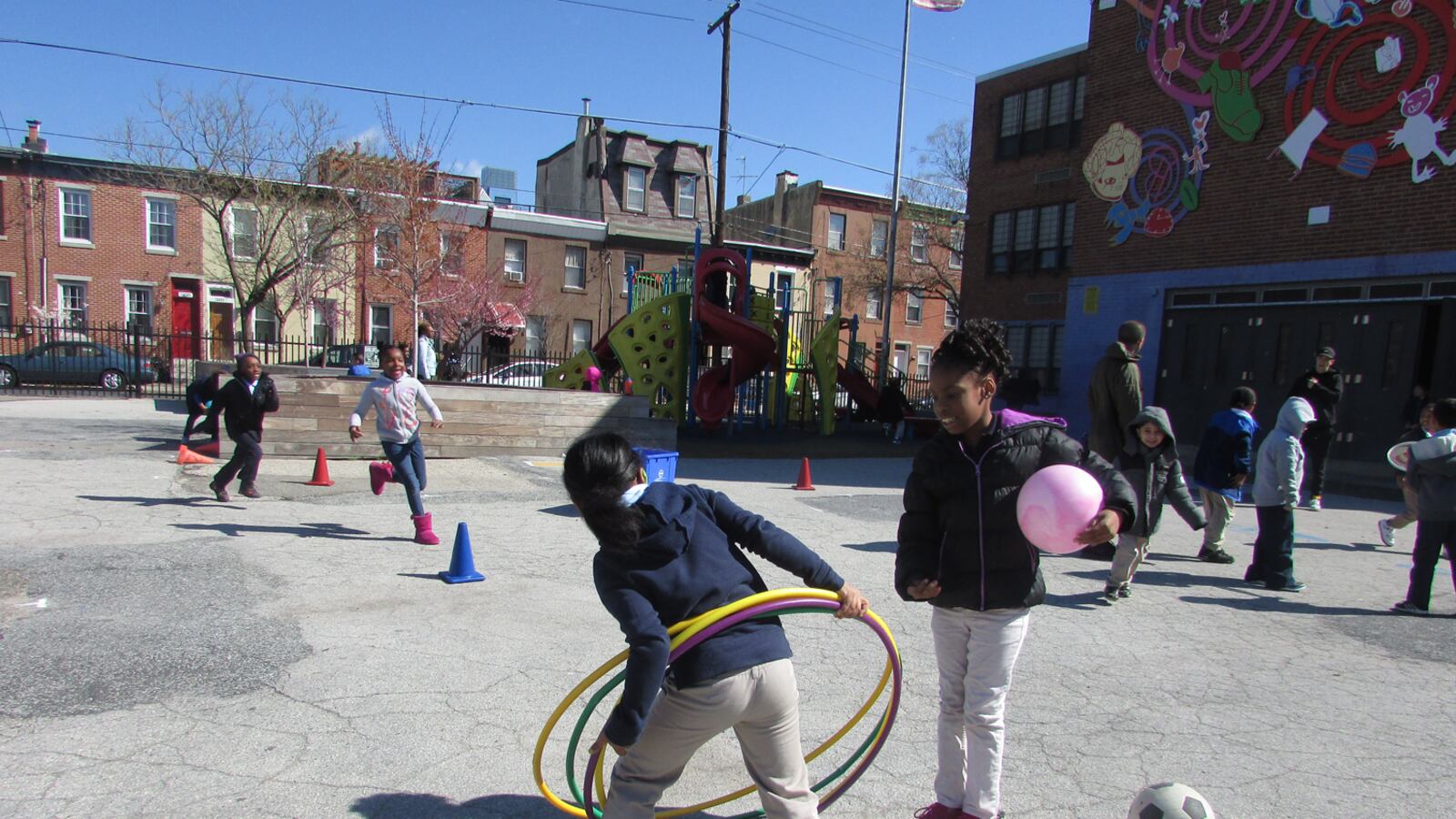This article was originally published in The Notebook. In August 2020, The Notebook became Chalkbeat Philadelphia.
Playtime has always been an important part of the day for elementary school students, helping them to develop physically, socially, emotionally, and academically. But in some schools, active play has not always been prioritized and recess has been reduced to just a break in the day.
The national organization Playworks is working to ensure that every U.S. child will get to play every day. Members of the group gathered Tuesday in Philadelphia for the “Why We Play” event to discuss and examine just how much recess and other play activities promote a positive school culture and affect a school’s learning environment.
The event, hosted by Playworks’ founder Jill Vialet and University of Pennsylvania professors Scott Barry Kaufman and Angela Duckworth, began with the obvious – an opportunity to play. Vialet asked staff members, parents, teachers, and others who attended to participate in a game called Stand Up, in which audience members were instructed to stand if they identified with a specific trait or action and to remain seated if they did not. The point of the exercise was to demonstrate how Playworks guides play and how it creates a connection between participants.
Playworks has partnered with 20 schools in the Philadelphia School District, including William Cramp Elementary School and Chester A. Arthur School, which raised funds last year to pay for Playworks’ $25,500 per year fee. To help schools like these better carry out recess and playtime activities, Playworks assigns a full-time, year-round coach to each partner school throughout the school day and after school to orchestrate play and physical activity. The coach oversees all recess and playtime activities, introducing basic rules and setting the tone for an enjoyable time. Their work has led to a decrease in bullying and more time for teaching.
“Recess was a huge part of my childhood experience,” said Vialet, who started the organization in 1997.
“[But over time] I noticed that play had really changed dramatically. It wasn’t very inclusive, it didn’t look like much fun, it just felt contentious and really like a drag to the school day,” she said.
Vialet said that she started Playworks in response to the lack of opportunities for unsupervised play. She said that there is a sense of togetherness in playing games that teach children about conflict resolution and the basics of how to play. But elementary children are not engaging in these as much because at many schools across the nation, recess is not required or has become a time where children just run and jump around, rather than engaging in organized activities. In Philadelphia, the District doesn’t track which schools provide recess, and though it is not mandated, recess is recommended as part of the elementary school schedule.
Ivy Olesh, executive director of Playworks Pennsylvania, said that Playworks tries to ensure that recess is an inclusive, enjoyable time for kids where everyone participates and gets along.
“Pretend” play, which involves games like “house” and “doctor” is also encouraged, said Kaufman.
“This kind of pretend play has proven to be very important for the development of childhood social skills, emotional regulation and executive functioning,” he said.
Kaufman added that play is a way of seeing a child’s potential in a way that standardized tests don’t capture. The results have been positive on the playground and in the classroom.
According to Playworks’ 2016 annual survey of administrators, teachers, and other staff at partner schools, 96 percent reported an increase in the number of students engaged in healthy play on the playground. Ninety-seven percent reported an increase in the number of students who are physically active, and 85 percent reported a decrease in the number of bullying incidents. The number of physical and verbal conflicts also went down at these schools.
The impact of play was also felt in the classroom, where 95 percent of staff recorded an increase in the level of participation in academic activities, and 93 percent reported an increase in students’ abilities to focus on class activities. Additionally, an average of 20 hours per year were recovered through faster transitioning of students from recess to the classroom, allowing teachers more time to focus on instruction. Playworks aims to engage over 3.5 million children across 7,000 elementary schools nationwide by December 2020.
“Play is an overlooked tool in the classroom,” said Vialet.
“Children learn how to resolve conflicts through play. It’s not just what the teacher does but what the students are doing that is the hallmark of teaching.”


